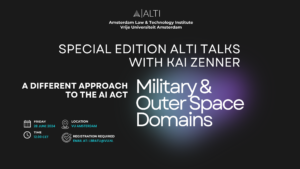On 28 June 2024, 12.00 – 13.00 CET, on campus at VU Amsterdam, ALTI is organizing a special edition of the ALTI Talks focused on the AI Act. There have been many valuable debates about what is included in the Act, but not many of them critically assessed what is not covered, either by explicit exclusion or by omission, and the rationale behind such legislative choices.
This time, none other than Kai Zenner (Head of Office and Digital Policy Advisor to MEP Axel Voss) will join us to discuss these exclusions, with a particular focus on military AI and AI applications used in outer space activities. See below more details on the topics covered.
If you wish to attend the event, please register in advance by sending an email at Ioana Bratu, co-Director ALTI (i.bratu@vu.nl). The event takes place entirely on campus and places are limited. You will receive a confirmation email with further instructions.
Abstract of the talk:
This presentation examines the scope and exclusions of the European Union’s Artificial Intelligence (AI) Act, with a particular focus on areas not covered by the regulation. While many debates have centered on the complexities and provisions of the Act, there has been limited discussion on its exclusions. Notably, the Act explicitly excludes AI systems used for military, defense, or national security purposes, as outlined in Article 2 and justified by Recital 24, which refers to Article 4(2) TEU and specific provisions of the Union defense policy.
Furthermore, the presentation explores the framing of “critical infrastructure” within the Act. Recital 33 references the definition in Article 2, point (4) of Directive (EU) 2022/2557, describing critical infrastructure as essential assets necessary for the provision of essential services. Recital 55 further specifies that AI systems used as safety components in managing critical digital infrastructure, road traffic, and utilities are classified as high-risk. However, the space sector, despite being recently qualified as critical by the European legislator, is notably excluded. This sector is also recognized in the Commission’s AI White Paper as essential alongside other now-included fields.
The discussion will delve into the reasons behind these exclusions, examining the explanations provided in Article 2 and exploring potential reasons for not including the space sector in the AI Act. Additionally, it will consider whether these domains might be included in future versions of the AI Act.



